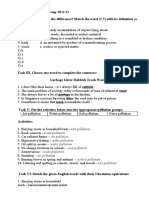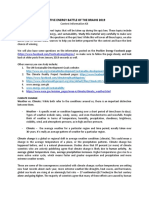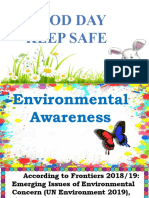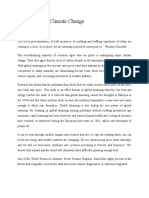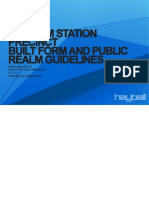Test Module 6
Test Module 6
Uploaded by
silvialemosCopyright:
Available Formats
Test Module 6
Test Module 6
Uploaded by
silvialemosCopyright
Available Formats
Share this document
Did you find this document useful?
Is this content inappropriate?
Copyright:
Available Formats
Test Module 6
Test Module 6
Uploaded by
silvialemosCopyright:
Available Formats
AGRUPAMENTO DE ESCOLAS SANTOS SIMÕES
ENGLISH TEST A: MODULE 6 – 11TH GRADE EVALUATION:
2023/2024
NAME: _ TEACHER: STUDENT:
DATE: No.: CLASS: _
LISTENING
1. Listen to an environmental scientist explaining what global warming is and fill in the blanks
with the missing words. CD 3 Tracks 24 භ 25 (10 1 p)
Global warming is the term used to describe a a. _ increase in the average
temperature of the Earth’s atmosphere and its b. _, which is believed to be
permanently changing the Earth’s c. .
There is great debate among many people, and sometimes in the news, on whether global
warming is real. But climate scientists looking at the data and facts agree the d.
is warming. The scientific consensus on climatic changes related to global
warming is that the average temperature of the Earth has risen e. 0.4 and
0.8 oC over the past 100 years.
The increased volumes of carbon dioxide and other f. _ gases released by the
burning of fossil fuels, land clearing, g. _ and other human activities are
believed to be the primary h. of the global warming that has occurred over
the past 50 years. Scientists have recently predicted that average global temperatures could
increase between 1.4 and 5.8 oC by the year 2100.
Changes resulting from global warming may include rising i. levels due to the
melting of the j. _ ice caps, as well as an increase in occurrence and severity of
storms and other severe weather events.
https://www.livescience.com (accessed in August 2018)
2. Listen to the text about global warming and correct the wrong information in each sentence.
CD 3 Tracks 26 භ 27 (8 2,5 p)
a. The levels of greenhouse gases are higher now than in the last 560,000 years.
b. Scientists often use the term “weather change” instead of “global warming”.
c. 63% of our electricity comes from burning coal.
d. Renewable energy sources are hydro, solar and gas.
e. Renewable energy sources means less oxygen is emitted.
f. Plants play an important role in regulating the climate because they absorb oxygen from the air.
g. When vegetation is planted, the stored carbon is released back into the atmosphere as CO2.
h. Up to ¼ of global greenhouse gas pollution comes from deforestation.
READING
1. Read the following text.
Ocean pollution: the dirty facts
Covering more than 70% of our planet, oceans are among the Earth’s most valuable natural
resources. They govern the weather, clean the air, help feed the world and provide a living for
millions. They are also home to most of life on Earth, from microscopic algae to the blue whale,
5 the largest animal on the planet. Yet we’re bombarding them with pollution. By their very nature
– with all streams flowing to rivers, all rivers leading to the sea – the oceans are the end point for
so much of the pollution we produce on land, however far from the coasts we may be. Our impact
on the seas is degrading their health at an alarming rate. Here are some ocean pollution facts that
everyone on our blue planet ought to know.
10 Ocean acidification
When we burn fossil fuels, we don’t pollute just the air but the oceans, too. Indeed, today’s
seas absorb as much as a quarter of all man-made carbon emissions, which changes the pH of
surface waters and leads to acidification. This problem is rapidly worsening. It’s estimated that
by the end of this century, if we keep pace with our current emissions practices, the surface
15 waters of the ocean could be nearly 150% more acidic than they are now.
Trash in the ocean
The majority of the garbage that enters the ocean each year is plastic. That’s because, unlike
other trash, the grocery bags, water bottles, drinking straws and yogurt containers, among
eight million metric tons of the plastic items we toss (instead of recycle), won’t biodegrade.
20 Instead, they can persist in the environment for a millennium, polluting our beaches, entangling
marine life and getting ingested by fish and seabirds.
Oil from boats, airplanes, cars, trucks and even lawn mowers is also swimming in ocean
waters. Chemical discharges from factories, raw sewage from water treatment systems and
agricultural spills are other forms of marine-poisoning pollutants.
25 Ocean noise
The ocean is far from a “silent world”. Sound waves travel farther and faster in the sea than
they do in the air, and many marine mammals like whales and dolphins, in addition to fish and
other sea creatures, rely on communication by sound to find food, mate and navigate. But
increasing human-generated ocean noise pollution is altering the underwater acoustic
30 landscape, harming – and even killing – marine species worldwide. Consider the incessant noise
of around 60,000 commercial tankers and container ships that travel the seas at any given time.
The underwater noise that results creates a kind of “smog” that reaches nearly every corner of
the ocean and reduces the sensory range of marine wildlife.
https://www.nrdc.org (accessed in August 2018)
2. Go through the text and find equivalents for the following words or expressions. (4 5 p)
a. the final destination
b. very fast
c. move at the same speed as
d. constantly
3. Say if the following sentences are True or False and justify by quoting from the text. (5 6 p)
a. Oceans cover more than half of the Earth’s surface.
b. Most of the pollution from the land flows into the oceans.
c. Carbon emissions cause air pollution but don’t endanger the oceans.
d. Most of the plastic we don’t recycle can biodegrade rapidly.
e. Noise pollution affects marine wildlife because they use sounds for their basic needs.
VOCABULARY AND GRAMMAR
1. Complete the text with the words in the box. (10 1,5 p)
trash land plastic marine activity beauty
deep mysterious oil ecosystem
What is ocean pollution?
The ocean remains one of the most expansive, a. _ and diverse places on Earth.
Unfortunately, it is being threatened by pollution from people on b. and from
natural causes. c. _ life is dying, and as a result the whole oceanicd.
_ is threatened simply by various sources of pollution. If we are to preserve the
ocean and its natural e. , drastic measures have to be taken to combat
pollution and keep what we hold most dear.
Before, it was assumed that because the ocean was so big, vast and f. _, the
effects of dumping g. into the sea would only have minimal consequences. But
as we have seen, this has proven to not be the case. While all four oceans have suffered as a result
of human h. for over millennia by now, it has accelerated in the past
few decades. i. spills, toxic wastes, floating j. and various
other factors have all contributed to the pollution of the ocean.
https://www.conserve-energy-future.com (accessed in August 2018)
2. Form a meaningful verb by adding a prefix or a suffix to the word given. (5 3 p)
a. All of us should (use) old items instead of throwing them away.
b. Stores should _ (courage) the use of fabric shopping bags.
c. Factories have to (modern) their air filter systems to reduce emissions.
d. Scientists are not sure if it is possible to _ (do) the damage to the environment.
e. If scientists find a way to (pure) the polluted air it will be a huge breakthrough.
3. Rewrite the sentences in the passive voice. (4 5 p)
a. We will reverse the global warming process with sustainable living habits.
The global warming process
b. Continuous habitat destruction kills many animal and plant species every day.
Many animal and plant species
c. Factories contaminated rivers and waterways with sewage and toxic waste.
Rivers and waterways
d. We should reduce the use of plastic packaging.
The use of plastic packaging
4. Choose the correct linking word to complete the sentences. (4 5 p)
a. Many natural habitats are disappearing because / that is why forests are being wiped out.
b. There are plenty of recycling points on the street due to / in order to encourage
people todispose of recyclables.
c. Although / As tons of plastic are still thrown into waters and rivers, the threat
to marine wildlife remains.
d. Natural resources are being exploited to the limit so that / because of growing
population rates.
5. Complete the sentences with the infinitive with or without to. (4 5 p)
a. I never forget _ (sort) my garbage into the suitable colour bins.
b. We all should encourage friends and relatives _ (be) more
environmentally-friendly.
c. The BBC documentary on sea pollution made me _
(understand) howserious the pollution problem is.
d. Some supermarkets are persuading customers (buy) fewer
plastic-packagedproducts.
WRITING
Write a short argumentative text about the different perspectives on the causes of climate
change. Is it related to human activity or just a natural and cyclical process of change?
You might also like
- Survey Methods of African ElephantsDocument6 pagesSurvey Methods of African ElephantsElla100% (6)
- Paramit Factory Case StudyDocument17 pagesParamit Factory Case StudyB-05 ISHA PATEL100% (2)
- Persiapan PSADocument11 pagesPersiapan PSAGoblin From Mars 2No ratings yet
- Bản sao READING K11 KTTX3 GUI HSDocument7 pagesBản sao READING K11 KTTX3 GUI HShaaphuongg24No ratings yet
- 雅思核心话题 Topic 4- Nature, the environment and energyDocument12 pages雅思核心话题 Topic 4- Nature, the environment and energyqiaodanyu96No ratings yet
- 10 Ways Humans Impact The EnvironmentDocument9 pages10 Ways Humans Impact The EnvironmentLucíaNo ratings yet
- Dissertation On Environmental Pollution PDFDocument5 pagesDissertation On Environmental Pollution PDFWriteMyPaperReviewsSingapore100% (1)
- 380 Bai Luan Mau Tieng Anh Phan 4Document54 pages380 Bai Luan Mau Tieng Anh Phan 4Từ TốnNo ratings yet
- Regulating The Climate - Reading ComprehensionDocument3 pagesRegulating The Climate - Reading ComprehensionMathéo CarpentierNo ratings yet
- Environmental IssuesDocument21 pagesEnvironmental IssuesВалерія ВласоваNo ratings yet
- Science 7 Quarter 4 Week 2 Lesson 1-4Document8 pagesScience 7 Quarter 4 Week 2 Lesson 1-4RAINIER DE JESUSNo ratings yet
- NSTP Report FinalDocument23 pagesNSTP Report FinalDwight AlipioNo ratings yet
- Marpol FinishDocument202 pagesMarpol FinishBim AranasNo ratings yet
- Mother Planet Is Showing Us The Red WarningDocument5 pagesMother Planet Is Showing Us The Red WarningNastya CaramelNo ratings yet
- STS MaterialsDocument11 pagesSTS MaterialsJonalyn PiamonteNo ratings yet
- IV. Recognizing National Issues and Concern - B-Environmental Awareness ProtectionDocument9 pagesIV. Recognizing National Issues and Concern - B-Environmental Awareness ProtectionMicsjadeCastilloNo ratings yet
- Ocean As A Victim of Climate Change and A Key SolutionDocument3 pagesOcean As A Victim of Climate Change and A Key SolutionNabila ZahraNo ratings yet
- FR 1 Selesai FadhilaDocument4 pagesFR 1 Selesai Fadhilafadhila100% (1)
- Complete The Text Below With Words From The BoxDocument2 pagesComplete The Text Below With Words From The BoxAlexandraSochircaNo ratings yet
- Pollution Is The Degradation of Natural Environment by External Substances Introduced Directly or IndirectlyDocument9 pagesPollution Is The Degradation of Natural Environment by External Substances Introduced Directly or IndirectlyMariela ChavezNo ratings yet
- Botb Semis Info Kit 2019 PDFDocument30 pagesBotb Semis Info Kit 2019 PDFJessa Casile VillacampaNo ratings yet
- Environmental AwarenessDocument38 pagesEnvironmental Awarenessroselyn ayensaNo ratings yet
- Fotosintesis y Cambio ClimativoDocument8 pagesFotosintesis y Cambio ClimativoJuanK-milo DurangoNo ratings yet
- Case StudyDocument5 pagesCase StudyAnn De Vera100% (2)
- ZuhraDocument7 pagesZuhraaliahmetow07No ratings yet
- Ecology Lesson 3FDocument6 pagesEcology Lesson 3FLingayo, Deseree C.No ratings yet
- Climate ChangeDocument8 pagesClimate ChangeZulfqar AhmadNo ratings yet
- Universidad Tecnologica de Honduras: Homework 3Document6 pagesUniversidad Tecnologica de Honduras: Homework 3hector meza100% (1)
- Alhadeetha Mindanao College: Dalapang, Labangan, Zamboanga Del SurDocument7 pagesAlhadeetha Mindanao College: Dalapang, Labangan, Zamboanga Del SurArbaya CaugNo ratings yet
- Your Notes On The Topic:: My Step-By-Step Writing (Paragraph)Document2 pagesYour Notes On The Topic:: My Step-By-Step Writing (Paragraph)Bryan PonceNo ratings yet
- NSTP Semi Finals Lesson 1Document25 pagesNSTP Semi Finals Lesson 1Reabels FranciscoNo ratings yet
- Global Issues 1 Test PDFDocument20 pagesGlobal Issues 1 Test PDFchandara rimNo ratings yet
- Speaking OutlineDocument5 pagesSpeaking OutlineAna Arauz NuñezNo ratings yet
- Environment-Comp KS3 DONEDocument4 pagesEnvironment-Comp KS3 DONEitsmortal742No ratings yet
- 10pel 19Document4 pages10pel 19Nandhu MattaNo ratings yet
- Science Module 2 PDFDocument2 pagesScience Module 2 PDFNicole Faye GonzalesNo ratings yet
- Reading 4Document9 pagesReading 4Phan Hữu SơnNo ratings yet
- Environmental Threats: Submitted ByDocument14 pagesEnvironmental Threats: Submitted ByKalyani JNo ratings yet
- Saving the World 1x1: Nature Conservation, Environmental Protection & Climate Protection for Beginners: How to Recognize the Problems of Today’s World and Gradually Improve Them in Small StepsFrom EverandSaving the World 1x1: Nature Conservation, Environmental Protection & Climate Protection for Beginners: How to Recognize the Problems of Today’s World and Gradually Improve Them in Small StepsNo ratings yet
- Natural ResourcesDocument2 pagesNatural ResourceshomamunfatNo ratings yet
- 5 Positive and 5 Negative Environmental Impacts Done by HumanityDocument4 pages5 Positive and 5 Negative Environmental Impacts Done by HumanityAriana GonzálezNo ratings yet
- Climate Change - National Wildlife FederationDocument9 pagesClimate Change - National Wildlife FederationSuresh MohanNo ratings yet
- PrismReading L2Document18 pagesPrismReading L2Hemo ZoneNo ratings yet
- Ocean Pollution ThesisDocument7 pagesOcean Pollution Thesisjenniferslatteryranchocucamonga100% (2)
- Nanotech Filter: Modern Methods For World SanitationDocument10 pagesNanotech Filter: Modern Methods For World SanitationGwyneth MarañaNo ratings yet
- Environmental ProblemsDocument8 pagesEnvironmental ProblemsM WaqarNo ratings yet
- Trabajo InglesDocument4 pagesTrabajo InglesJonathan Alonso Cruz CarranzaNo ratings yet
- Nstp-Cwts Module 6Document8 pagesNstp-Cwts Module 6Harvey BareteNo ratings yet
- Week009 Global and Environmental Problems and Global EffortsDocument4 pagesWeek009 Global and Environmental Problems and Global EffortsEthan RosarioNo ratings yet
- LESSON 11. Environmental Crisis and Sustainable DevelopmentDocument7 pagesLESSON 11. Environmental Crisis and Sustainable Developmentjoververgara1No ratings yet
- Global WarmingDocument3 pagesGlobal WarmingshawonmahmoodNo ratings yet
- CSTC NSTP Lesson 6 Environmental Awareness PDFDocument16 pagesCSTC NSTP Lesson 6 Environmental Awareness PDFRochelle Obdianela De CastroNo ratings yet
- EnvironmentDocument17 pagesEnvironmentTânia CunhaNo ratings yet
- Causes of Global Warming-1Document9 pagesCauses of Global Warming-1Salim Mohammed0% (1)
- Bai Tap Tieng Anh 8 Bai 7Document23 pagesBai Tap Tieng Anh 8 Bai 7ntha16103No ratings yet
- 2023 Environmental Studies Final ExamDocument3 pages2023 Environmental Studies Final Examangelica valenzonaNo ratings yet
- Environmental Impact of Energy Resources in Biomass and Petroleum Oil PerspectiveDocument19 pagesEnvironmental Impact of Energy Resources in Biomass and Petroleum Oil PerspectiveAhmad Muhammad AdamNo ratings yet
- Environmental Protection and Ways People Damage ThemDocument12 pagesEnvironmental Protection and Ways People Damage ThemJs PoojaNo ratings yet
- Bai Tap Tieng Anh 8 Bai 7Document22 pagesBai Tap Tieng Anh 8 Bai 7phamhuyen290910No ratings yet
- Environmental Science ReportDocument4 pagesEnvironmental Science ReportAs YangNo ratings yet
- Resources Used Faster Than They Are ReplenishedDocument2 pagesResources Used Faster Than They Are ReplenishedHorsadill369No ratings yet
- REDUCE REUSE RECYCLE SteveTrashScience GradeSpecific 1 5questions PDFDocument12 pagesREDUCE REUSE RECYCLE SteveTrashScience GradeSpecific 1 5questions PDFLuis Fernando CubillasNo ratings yet
- AGRI 32 - Exercise 2Document2 pagesAGRI 32 - Exercise 2Kate BishopNo ratings yet
- Part 4Document6 pagesPart 4Romain DanielNo ratings yet
- Term Paper ENG102Document13 pagesTerm Paper ENG102alexsopnoNo ratings yet
- SWPPPConstruction Activity TDocument8 pagesSWPPPConstruction Activity TMichael L HerreraNo ratings yet
- Lesson Target You Will Be Able ToDocument2 pagesLesson Target You Will Be Able ToChix EspinaNo ratings yet
- Adaptation & AcclimatizationDocument2 pagesAdaptation & AcclimatizationalfredNo ratings yet
- Cero Conference Brochure - 2Document5 pagesCero Conference Brochure - 2Shalu SaharanNo ratings yet
- Bryophytes As IndicatorDocument10 pagesBryophytes As Indicatormanojtbgri5793No ratings yet
- Global Warming: Sma N 1 KutaDocument4 pagesGlobal Warming: Sma N 1 KutaTL IGustiAgungAyuTrinadyaNo ratings yet
- Harvest Landing Specific Plan ReportDocument7 pagesHarvest Landing Specific Plan ReportThe Press-Enterprise / pressenterprise.comNo ratings yet
- JRPP Report - BunningsDocument34 pagesJRPP Report - BunningsDia SanNo ratings yet
- The Man Who ...Document13 pagesThe Man Who ...Öykü ArdaNo ratings yet
- GRHSB05 Pardo - Villazon BoliviaDocument9 pagesGRHSB05 Pardo - Villazon BoliviaTed FarfegnugenNo ratings yet
- BSBSUS601-Assessment Requirements - pdf.v1.0Document3 pagesBSBSUS601-Assessment Requirements - pdf.v1.0sheenalprasad30No ratings yet
- Clean and Smart Campus 2020 PresentationDocument29 pagesClean and Smart Campus 2020 PresentationPriyanka PawarNo ratings yet
- West Rand Spatial Development FrameworkDocument232 pagesWest Rand Spatial Development FrameworktfliphadziNo ratings yet
- Urbanisation: IG TRP - Class 8 - SBAK - Indd 12 1/10/2018 12:12:03 PMDocument4 pagesUrbanisation: IG TRP - Class 8 - SBAK - Indd 12 1/10/2018 12:12:03 PManshum11No ratings yet
- Mitcham Station Precinct Built Form and Public Realm GuidelinesDocument28 pagesMitcham Station Precinct Built Form and Public Realm GuidelinesJimmy LiuNo ratings yet
- CSR Impact Report Template - OriginalDocument10 pagesCSR Impact Report Template - OriginalLalit BabuNo ratings yet
- EMP TemplateDocument5 pagesEMP TemplateNisanth ThulasidasNo ratings yet
- 2014 Book MarginalityDocument388 pages2014 Book MarginalityKit NiNo ratings yet
- Kajian Fisika Kimia Perairan Danau Bangkau Sebagai Dasar Pengembangan Budidaya IkanDocument8 pagesKajian Fisika Kimia Perairan Danau Bangkau Sebagai Dasar Pengembangan Budidaya Ikanantoni harahapNo ratings yet
- Bio Project 12thDocument28 pagesBio Project 12thƦakeshNo ratings yet
- Handout 3 Four Thrusts of ESDDocument6 pagesHandout 3 Four Thrusts of ESDSamra MasoodNo ratings yet
- Spring in Australia Differentiated Reading Comprehension ActivityDocument13 pagesSpring in Australia Differentiated Reading Comprehension ActivityKannybell BelleNo ratings yet
- Let's Dig Deeper and Learn More About Environmental Awareness !Document3 pagesLet's Dig Deeper and Learn More About Environmental Awareness !Angelo AlejandroNo ratings yet
- Aspek Bio-Ekologi Dan Pemanfaatan Kerang Marga Anadara (Mollusca: Bivalvia: Arcidae)Document17 pagesAspek Bio-Ekologi Dan Pemanfaatan Kerang Marga Anadara (Mollusca: Bivalvia: Arcidae)SabrinaNo ratings yet













